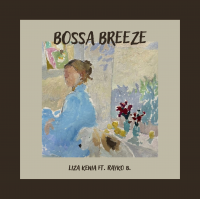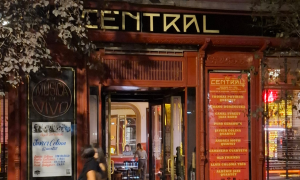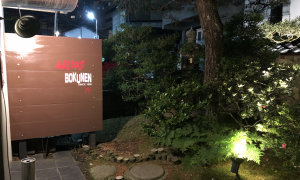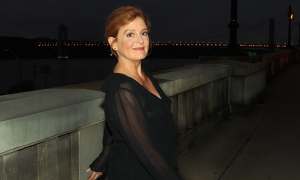Home » Jazz Articles » The Jazz Life » Harvie S: Building A Better Jam Session
Harvie S: Building A Better Jam Session
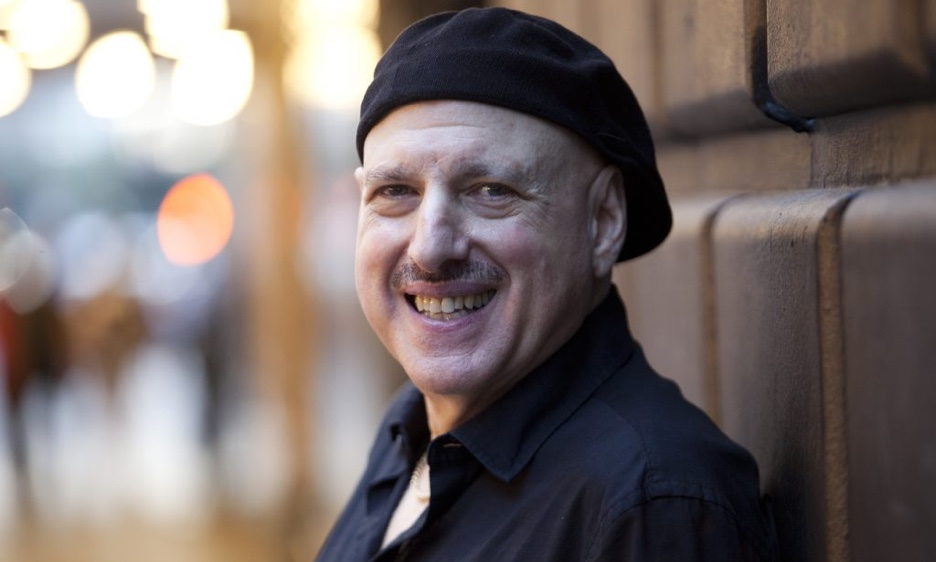
Courtesy Harvie S
And [Barrie Kolstein said] we’d like to work with you... so I said, well, in order to get more visibility, why don't you have a jam [session]?
—Harvie S
Which is interesting, because I've found that jam sessions are almost always better if you're also there to listen. Both as a member of the audience, but also on the bandstand with fellow musicians. It is, in my humble opinion, just about the best place to work on your ear training, and musical conversations, something you really can't do as well on your own at home.
Jazz jam sessions have a lot in common with blind dates, and restaurants you've never eaten in before—often high expectations in the anticipation, and usually a feeling of being let down in some fashion in the actual experience. Though certainly not always. In that regard, jam sessions are also a bit like going to an Atlantic City casino.
There are those unusual moments we all hope for, when you find yourself in a group that might contain friends or acquaintances, and total strangers, and everything just clicks in a charmed way. Of course moments like that are the Jackpot Atlantic City moments. A lot of the time we walk away from sessions feeling unhappy with our playing. It's like we went into the exam feeling like we had it nailed, and then found ourselves confronting questions we never anticipated would come up.
The number of great players who reportedly were never happy with their playing even in the best of circumstances (let alone jam sessions) is legion, and some of the names will surprise you, if you didn't know this about them already. Lennie Tristano told a student of his he had never been satisfied with almost anything he had recorded, including his seminal album "The New Tristano." In the 1960s, on receiving a compliment on his playing from a stranger, Wes Montgomery famously replied, "You should have heard me in 1948," [when he was touring with Lionel Hampton's big band]. The brilliant but bedeviled guitarist Billy Bean, when complimented on his playing said dismissively, "That? Oh, I was just goofing off when I did that." And, of all people, Bill Evans, who would often turn to bandmates after receiving a compliment from a fan (once he or she had walked away) and would say that the fan clearly had "tin ears" because Bill felt so disappointed with his playing that evening and the fan hadn't noticed.
So hosting, let alone starting a new jam session in a town like New York City, with all those musical egos ready to potentially clash with each other, is something of an act of courage. It's not unlike letting a lot of strangers know there is free beer and ice cream to be had if they come over and help themselves, only to discover the supply isn't endless, and the host has had to ask you (and everyone else) several times to remember to behave nicely with the other children; and no-one is quite sure how to manage, if the host does not, a gaggle of musicians readying to play, like gladiators about to enter the Roman arena. We, who are about to die...
I've been at jam sessions where the moment was magical, and everyone was listening and you come off the bandstand euphoric, and I've been at sessions where musicians not listening was the least of your problems. Drummers who wouldn't get off the stand even after being told bluntly to do so, guitar players and saxophone players who announced loudly in so many ways they are better than you, and have worked harder than you, and who proceeded to take endlessly long, loud and fast solos showing off what technique they've been working on. The goal is not so much to create music with strangers, as to announce they have "arrived." Though where they think they are is something of a mystery.
The fact that the veteran jazz bassist Harvie S (no ey) has started a jam session in Manhattan, and has found an office for himself at Kolstein's, one of New York's premiere bass shops (want to buy a very pretty version of virtuoso bassist Scott Lafaro's bass, anyone?), is inspiring.
Harvie has started what he calls a "polite" jam session. The intent, though, is not just to let musicians "do their thing." It's to provide a space where jazz enthusiasts—amateur, student, and professional, can play alongside each other without feeling either intimidated or condescending, while an appreciative audience is treated to some seriously good performances along with the occasional rookie mistake here and there, like a stumble of fingers, a misreading of a chart, a faltering of nerve and the skipping of a beat, but still, an honest and earnest commitment to the music.
Why Kolstein's?
All About Jazz: So, why choose Kolstein's, a bass shop on W. 58th Street near 6th Avenue, for a twice-monthly, evening jam session?Harvie S: I've been a very serious customer of Kolstein's for a very long time, and I'm a good friend of Barrie Kolstein.
I bought my last two acoustic basses from here, which are the best two basses I've ever had. We came up with a bass string that is the newest version of the Heritage string. They designed it, I tested it and gave them feedback, saying this works and this doesn't, it's too stiff, it's too loose, it's whatever. And people are buying it a lot. I mean, everyone's getting these strings 'cause it's definitely a new innovation in strings.
Anyway, one day Barrie said, you know, we have the New York shop as well as the one in Long Island, and we would like to get it more publicized. And we'd like to work with you on this. So I said, well, in order to get more visibility, why don't you have a jam? You know, 'cause it's set up here. You've got a piano, a drum set, and a good bass amp. They have the bass amp that I invented, you know, the Upshot. So, we've been doing the jam session thing since August [of 2023]. All my events here are like, 7 o'clock, doors open, 7:30 pm it starts. Finish at 10 pm.
Bass in the Corner—a Podcast
AAJ: Before getting to the jam session, I first asked Harvie about his podcast, which is another new thing he is doing.HS: It's called Bass in the Corner, mainly because I have a corner here at Kolstein's now, an office, with a sign and a table, Harvie's Corner. What I want to do, is help get the name of the shop out to a lot of bass players but also to acknowledge a lot of bass players who don't get acknowledgement. I mean, they play, they're working, they're making a good living, and they have interesting stories. I just didn't want to do a podcast where you just talk about, you know, strings and hand position and everything.
The podcast is about the human side of being a bassist. You know, there are these bass players who have been playing Broadway shows, cabaret shows, jazz groups, uh, you know, Latin groups, Brazilian and Afro Cuban style. I've done Mike Richmond, and Ratzo Harris, Noriko Ueda, and Mary Ann McSweeney. . . I kind of mixed everybody up and asked them to tell about how they got into music, you know, because almost every bassist who got into the bass got in, in a weird way.
Back Story
AAJ: So what's your story?HS: I was a pianist as a teenager. And back then there was the draft, and I didn't want to go in the Army to go fight a war I didn't believe in [Vietnam]. So I stayed and went to Berklee instead as a pianist. I had picked up a bass in the past and fooled around with it a little bit, but I wasn't a bassist. By the time I was at Berklee I decided, you know, I really liked the bass much better than the piano. But at the time Berklee didn't have very good bass teachers. Certainly not like they do now. But then, the bass teacher thing just wasn't happening. I'm sorry. It's how I felt. You should go to college to find the right teacher, you know what I mean? Anyway, I stayed as a piano major and ended up getting my degree in composition with a piano minor. But I was really playing bass mostly, and when George Mraz left I ended up getting his bass chair in the recording band, which was like the number one position. So that's how I ended up, you know, getting into the bass and all that. Meanwhile, I was still gigging on piano.
AAJ: Do you play much piano now?
HS: I play, yeah. But I don't perform. And, you know, look at the piano players around New York. I mean, these people really know their instruments. And they can do anything on it. I can play some simple stuff. I mean, I can get in there and play in a rhythm section and play okay. But compared to what's around New York city, I'm embarrassed to even look at a piano. But it's been great because when I teach, I play piano and the students can play bass, and I can accompany them, and then play a solo while they can walk behind me. Then I can critique them. So knowing the piano has been very valuable for me.
Building A Better Jam Session
AAJ: I mentioned I pick and choose the jam sessions I go and sit in on these days. And the ones that start to feel like I'm stepping into a basement boxing ring are the ones I try and avoid.HS: I went to a jam session recently. I don't normally go, but I went to this one and I gotta say, it was pretty depressing, you know. And they had a pianist there and he just doesn't listen. He was playing very loud. And, when it came to my solo, I didn't want to solo because he was already leading me into his harmonic world. Which is like, don't tell me what to do on my solo! You know, so I just kind of walked the course and said, the hell with it.
I never liked jam sessions too much. Because I've had so many bad experiences in them, you know, what with people calling tunes that are in really weird keys, people playing too long and too loud.
AAJ: I mentioned a singer at a session I played at who insisted on doing "'Round Midnight" in G-flat minor. A key I was going to have to try and transpose to on the spot without even a bassist, as it happened, and a young pianist who asked me if I had a chart on my phone, and by any chance could he take a quick picture of it? So, I had no shame reading that chart off my phone. As basic as it was, it was better than nothing for the job in hand: playing the right changes for that singer. And the three of us got through it ok, somehow.
HS: See, that's the first thing—"'Round Midnight" is the worst tune to call for a jam session. It's hard. I mean in terms of everyone playing the same set of changes. So, to me it's a no-no tune for a jam. "Come Rain or Come Shine"'s got a tricky section in it too. That's another one where people play odd changes to it sometimes.
AAJ: "Spring Can Really Hang You Up the Most." That's another one.
HS: Yeah. You know, there are certain tunes you just don't call on jam sessions. And that's why I'm saying, when I'm up there, if somebody calls "'Round Midnight," unless I know the guys up there can handle it, and the good ones will tell you flat out whether or not they know a tune in that key, I'm going to say, let's try another song. I don't even like to play "'Round Midnight" with anybody unless they have a chart. I know the Monk changes, but then there's the Miles changes, and then there's the mixture of the two and then if you put it in a different key... I don't want that on my jam session.
AAJ: Then there are some sessions that are so loose....
HS: That they make you nervous.
AAJ: More like I feel I'm on the edge of anarchy, I said jokingly. Or was I?
HS: I mean, look it. I remember one time doing a gig and it turned into a kind of a session. I didn't even know it was really gonna be like a session. And the set, they brought in all these saxophone players. I never saw anything like it. Alto players and tenor players. They were lined up. And it was a great rhythm section. I'm not gonna say who this band was, but really great players.
This one set just went on and on for two and a half hours. And all the sax players were playing like chorus after chorus. And eventually, eventually, I got really angry. I said I can't do this anymore. You know, I told the bandleader, we gotta stop. You know, I'm playing the bass for two and a half hours. And they're doing up-tempos and doing all this stuff.
Truth is, I don't want to play with people who don't listen to me. And here [at Kolstein's] it's been good.
You know, everyone's always like, where's the bass? Gotta have a bassist. Well, I'm right here. Every session, I'll be starting. Whoever shows up early will play with me. And then, I hope other bass players will come in, just like they do now.
The concept is, you're here to have a good time, help make a good vibe. You'll get to play a little bit, maybe not quite as much as you wanted, but then again, you might play more if there aren't that many people. You know, we don't know what's going to happen from session to session, who will be here. But the idea is to sit around, meet people. You know, make some new friends. Hear some good music. Play some good music. There's so many good things that can happen, right?
I want it to be a friendly event, and there's been some really, you know, wonderful players like yourself that come in and play. But there's been a couple of players that aren't that good. And I think it's great that they have the courage to come up and play. And I encourage them to come and play and I discourage anybody giving anybody a hard time. You know, uh, if somebody comes up and they screw up, so they screw up, what's the big deal? It's how we all learned. There needs to be room for people to grow.
I've met a bunch of new friends. And it's been a great thing for me. And I pride myself so far, that everybody got a chance to play that came, and I've been discovering that's not so easy. Because, you know, some people come in late. And I make a list and, and I follow it as closely as I can. Like, you know, if somebody comes in an hour before it's over and someone else's been there early, I'm not going to let that person who got there early wait until the end to play.
HS: I tell people, I say, if you don't sign the list then don't count on me calling you to play. Don't come in at the end and expect that I know you're there. Right. But I also have Tyler who does the door. I tell him, you know, let everybody know. And he does a great job with that.
Be mindful there's a whole bunch of people here who want to play too. And people seem to like coming to the jam session to listen to the music. I work hard to organize it, and I'm starting to know who's who, and I'm saying to myself, if I bring this person up with this other person also there, it's not going to be so good. So maybe I'll let them get up here separately. That's another time when I break the order a little bit.
I just try to feel it. Feel the moment. Like, you know, there was one tenor player, he was a really good tenor player. So, he came up and played with this singer, but then the next song, after the singer left, I said to him, you do the next song.
AAJ: I mentioned I had hired a couple of young bass players I met at his session for gigs of my own. And I actually scat sang a chorus on a blues at the session, which I'd never done in public before.
HS: That's great. I really, though, try to tell people, you don't have to come here to play. Just come. Hang out and sit, and if you know people bring them along, too. Alan Broadbent came in one night just for the jam session. And Bill Crow and Jay Leonhart. And, there are some really wonderful players who sit in. Not, you know, super famous, but great, great players, like this pianist who sat in and he was so good I hired him for the next jam session.
I look forward to seeing more people come here to play, and to listen.
AAJ: One thing is for sure, there won't be a problem finding bass players.
Tags
The Jazz Life
Harvie S
Peter Rubie
Lennie Tristano
Wes Montgomery
Lionel Hampton
Billy Bean
Bill Evans
PREVIOUS / NEXT
Support All About Jazz
 All About Jazz has been a pillar of jazz since 1995, championing it as an art form and, more importantly, supporting the musicians who make it. Our enduring commitment has made "AAJ" one of the most culturally important websites of its kind, read by hundreds of thousands of fans, musicians and industry figures every month.
All About Jazz has been a pillar of jazz since 1995, championing it as an art form and, more importantly, supporting the musicians who make it. Our enduring commitment has made "AAJ" one of the most culturally important websites of its kind, read by hundreds of thousands of fans, musicians and industry figures every month.











